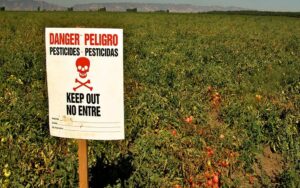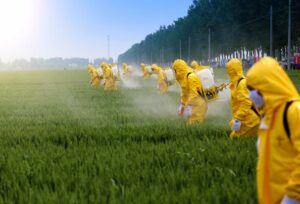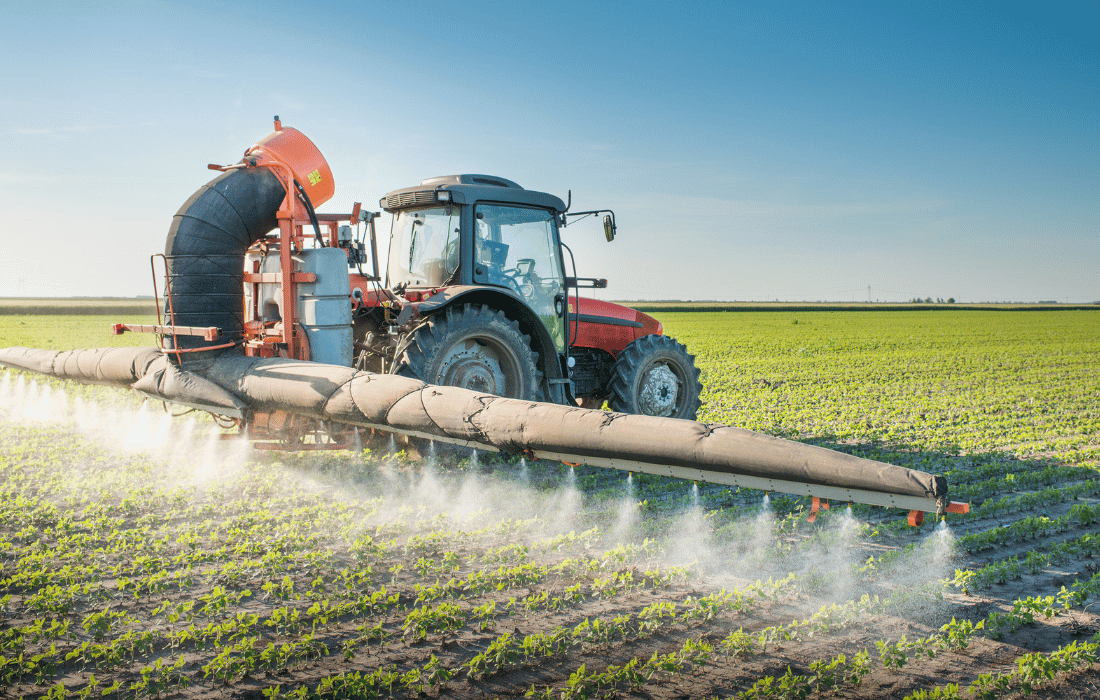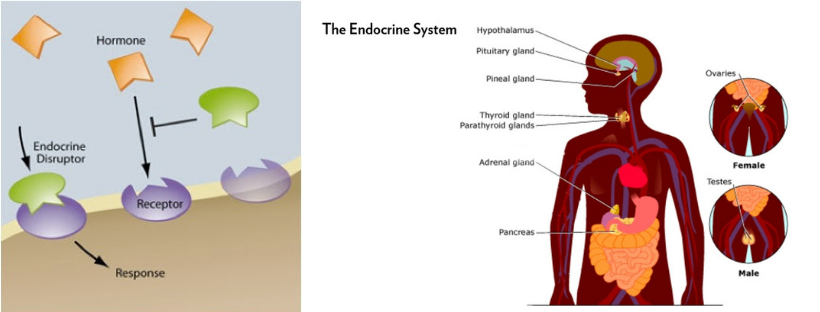Gentlemen, it’s time we had an honest conversation about something that silently destroys our health and that of our families—pesticides. These chemicals, omnipresent in the United States food supply, are used to protect crops from pests but end up infiltrating our bodies, posing significant health risks. Switching to an organic diet can dramatically reduce your exposure to these harmful substances. While many look at shopping organic as a “bougie” or excessive option, I truly believe in the value of voting with our dollar. Here’s why you should make the switch to organic for your household’s health.
Understanding Pesticides and Their Health Risks
 Pesticides are chemicals designed to kill or repel pests, but their toxic properties do not stop with insects. These chemicals can have far-reaching effects on human health, particularly when they accumulate in our bodies over time.
Pesticides are chemicals designed to kill or repel pests, but their toxic properties do not stop with insects. These chemicals can have far-reaching effects on human health, particularly when they accumulate in our bodies over time.
Cancer Risks
One of the most alarming health risks associated with pesticides is cancer. Studies have linked long-term exposure to certain pesticides with an increased risk of various cancers, including leukemia, lymphoma, and brain cancer. For instance, glyphosate, the active ingredient in many herbicides, has been classified as a probable human carcinogen by the International Agency for Research on Cancer (IARC).
Hormone Disruption
Pesticides can interfere with the endocrine system, which regulates hormones in the body. Chemicals like atrazine and certain organophosphates are known endocrine disruptors. They can mimic or block hormones and disrupt the body’s normal functions, leading to reproductive issues, thyroid problems, and developmental disorders in children.
Neurological Disorders
Exposure to neurotoxic pesticides, such as organophosphates and carbamates, has been linked to neurological disorders. These chemicals can damage the nervous system, leading to cognitive decline, behavioral issues, and an increased risk of neurodegenerative diseases like Parkinson’s and Alzheimer’s.
Immune System Suppression
Pesticides can also weaken the immune system, making it harder for the body to fight off infections and diseases. Chronic exposure to these chemicals can lead to immunosuppression, increasing susceptibility to illnesses.
The Benefits of an Organic Diet
Switching to an organic diet is one of the most effective ways to reduce pesticide exposure. A peer-reviewed study published in Environmental Research demonstrated that participants who switched to an organic diet saw a 60.5% reduction in pesticide levels in their bodies after just six days.
Significant Reductions in Pesticide Levels
- 61% drop in chlorpyrifos: This neurotoxic pesticide is known to damage children’s developing brains.
- 95% drop in malathion: A probable human carcinogen.
- 83% drop in clothianidin: Linked to endocrine disruption.
- 43-57% drop in pyrethroids: Associated with neurodevelopmental and reproductive issues.
- 37% drop in 2,4-D: A component of Agent Orange, linked to endocrine disruption and cancer.
Misconceptions About Organic Food
Many people perceive organic food as a luxury or a trend for the elite. However, the term “organic” simply means food produced without synthetic pesticides and fertilizers. Organic farming practices promote soil health, reduce pollution, and support biodiversity, making them better for the environment and your health.
The Problem with Industrial Farming
Industrial farming in the United States relies heavily on synthetic pesticides and fertilizers, which not only poison our food but also degrade the environment. This method of farming is unsustainable and contributes to a range of environmental problems, including soil degradation, water contamination, and loss of biodiversity.
History of Pesticide Use

The widespread use of pesticides began in the mid-20th century. Chemicals developed for warfare were repurposed for agricultural use, leading to the adoption of synthetic pesticides like DDT. Initially celebrated for their effectiveness, these chemicals were later found to have severe environmental and health consequences, leading to bans and restrictions. However, many harmful pesticides remain in use today.
Early Days of Pesticides
In the early days, the use of pesticides like DDT was hailed as a breakthrough in agricultural science. It was widely used during World War II to protect troops from insect-borne diseases. After the war, it found its way into agriculture, dramatically increasing crop yields. However, it didn’t take long for scientists to discover that DDT had devastating effects on wildlife, particularly birds. Rachel Carson’s seminal book “Silent Spring,” published in 1962, highlighted these issues and led to the eventual ban of DDT in many countries.
Modern Pesticides
 Today, the pesticides used in agriculture are different, but the problems remain. Organophosphates, neonicotinoids, and pyrethroids are commonly used pesticides that have been linked to a variety of health issues. Organophosphates, for example, are potent neurotoxins, while neonicotinoids are associated with bee population declines, which can have cascading effects on ecosystems.
Today, the pesticides used in agriculture are different, but the problems remain. Organophosphates, neonicotinoids, and pyrethroids are commonly used pesticides that have been linked to a variety of health issues. Organophosphates, for example, are potent neurotoxins, while neonicotinoids are associated with bee population declines, which can have cascading effects on ecosystems.
Environmental Impact
Pesticides contaminate soil, water, and air, harming wildlife and ecosystems. They can kill beneficial insects like bees and butterflies, essential for pollination. Pesticides also contaminate water sources, affecting fish and other aquatic life. By reducing or eliminating pesticide use, organic farming helps protect the environment and promotes biodiversity.
Soil Degradation
One of the most significant environmental impacts of industrial farming is soil degradation. Healthy soil is teeming with life and is crucial for plant growth. However, the heavy use of pesticides and synthetic fertilizers kills beneficial microorganisms in the soil, leading to a loss of soil fertility. Over time, this results in decreased crop yields and increased susceptibility to pests and diseases.
Water Contamination
Pesticides and fertilizers often run off into nearby water bodies, contaminating drinking water supplies and harming aquatic ecosystems. For example, atrazine, a widely used herbicide, has been found in drinking water across the United States and is linked to birth defects, low birth weight, and menstrual problems.
The Case for Regenerative Organic Farming
Regenerative organic farming offers a sustainable alternative to industrial agriculture. This method focuses on practices that restore and enhance soil health, promote biodiversity, and improve the overall ecosystem. Unlike conventional farming, which relies on chemical inputs, regenerative organic farming uses natural processes to build soil fertility and control pests.
Practices in Regenerative Farming
- Crop Rotation: Changing the types of crops grown in a particular area each season to prevent soil depletion and reduce pest and disease buildup.
- Cover Cropping: Growing cover crops during off-seasons to prevent soil erosion, improve soil structure, and add organic matter to the soil.
- Composting: Adding compost to soil increases its organic matter content, improving soil health and reducing the need for chemical fertilizers.
- Reduced Tillage: Minimizing soil disturbance preserves soil structure, promotes the growth of beneficial soil organisms, and reduces erosion.
Soil Health: The Foundation of Sustainable Agriculture
Healthy soil is vital for sustainable farming. It’s full of life, including bacteria, fungi, earthworms, and other organisms that contribute to nutrient cycling and soil structure. Industrial farming practices, such as monocropping and heavy pesticide use, degrade soil health by killing these beneficial organisms and depleting nutrients.
Benefits of Healthy Soil
- Increased Crop Yields: Healthy soil supports higher crop yields and better-quality produce.
- Climate Resilience: Healthy soil retains moisture better and helps crops withstand droughts and floods.
- Carbon Sequestration: Healthy soil sequesters carbon, helping mitigate climate change.
Local and Organic: A Winning Combination
While choosing organic is crucial, sourcing locally grown organic produce can enhance the benefits. Local produce is typically fresher and more nutrient-dense because it doesn’t have to travel long distances. It also supports local economies and promotes sustainable agricultural practices. By buying from local farmers, you can ensure your food meets the highest standards of quality and sustainability.
Supporting Local Economies
Buying local not only ensures fresher produce but also supports local farmers and economies. It reduces the carbon footprint associated with transporting food over long distances and helps maintain farmland and green spaces in your community.
Practical Tips for Going Organic
Making the switch to organic doesn’t have to be overwhelming or expensive. Here are some practical tips:
- Prioritize High-Risk Produce: Start by switching to organic for the most pesticide-laden fruits and vegetables, such as strawberries, spinach, and apples.
- Shop Local: Visit farmers’ markets or join a CSA (Community Supported Agriculture) to get fresh, seasonal, and often more affordable organic produce.
- Grow Your Own: If you have space, consider growing your own organic vegetables. Even a small garden can provide a steady supply of fresh produce.
- Buy in Bulk: Purchase organic grains, nuts, and seeds in bulk to save money and reduce packaging waste.
- Cook at Home: Preparing meals at home allows you to control the ingredients and ensure that you are eating organic food.
Economic Impact of Organic Farming
Supporting organic farming isn’t just good for your health and the environment; it’s also beneficial for the economy. Organic farms often rely on smaller, family-owned operations, which help support local economies and create jobs. Additionally, organic farming practices can lead to higher crop yields and lower production costs over time, making it a more sustainable economic model.
Organic Farming and Job Creation
Organic farming tends to be more labor-intensive than conventional farming, requiring more workers per acre. This can help create jobs and stimulate local economies. Furthermore, organic farms often employ practices that are beneficial to the local environment, such as crop rotation and the use of cover crops, which can help improve soil health and reduce the need for chemical inputs.
Take Action: The Organic Challenge
Switching to an organic diet for just one week can significantly reduce the levels of harmful pesticides in your body. The benefits extend beyond personal health, creating a more sustainable and environmentally friendly food system.
Embracing an Organic Lifestyle
Choosing organic is not just about avoiding pesticides; it’s about embracing a lifestyle that promotes well-being, supports sustainable agriculture, and protects the environment. Take the one-week organic challenge and see the difference for yourself. Your body and the planet will thank you.
Check out my detailed article for more insights on how an organic diet can halve your blood pesticide levels and how to safely remove glyphosate from your gut microbiome.
Final Thoughts
Switching to organic food is a powerful step towards better health and a cleaner environment. It’s not just a trend but a necessity in a world increasingly burdened by chemical exposures. By choosing organic, you’re making a statement about the kind of world you want to live in—one that values health, sustainability, and the well-being of future generations. Make the switch today and start reaping the benefits of a cleaner, healthier diet.









